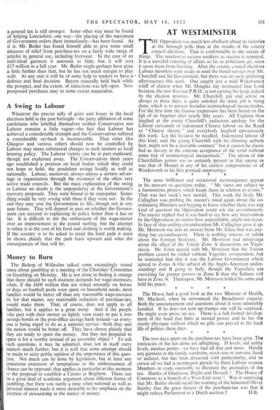AT WESTMINSTER
THE Opposition was much less ebullient about its victories at the borough polls than at the results of the county council elections. That is conformable to the nature of things. The reaction to success weakens as success is repeated. It is a merciful ordering of affairs so far as politicians go, since it saves them from bursting. After the county council elections Labour members were ready to read the burial service over Mr.
' Churchill and his Government, but there was no such jubilating effervescence this week. One caught just a mild Wykehamist whiff of elation when Mr. Douglas Jay insinuated that Lord Swinton, the new five-star P.R.O., is not earning his keep, judged by the election reverses. Mr. Churchill, gay and serene as always in these days, is quite satisfied the main job is being done, which is to answer Socialist terminological inexactitudes. For the first time the famous expression has been heard on the lips of its begetter after nearly fifty years. All England then laughed at the young Churchill's audacious apology for the Liberal caricature of indentured Chinese labour on the Rand as "Chinese slavery" and everybody laughed uproariously this week. Let the incident be recalled. Indentured labour of this kind, said the young Churchill with his thinning auburn hair, might not be a desirable contract," but it cannot be classi- fied as slavery in the extreme acceptance of the word without some risk of terminological inexactitude." The idiom of the Churchillian genius was as certainly present in that saying as was that of Mozart in any of his earliest compositions or of Wordsworth in his first poetical outpourings. * * * • The same brilliance and occasional inconsequence appear in his answers to questions today. "My views are subject to a harmonious process which keeps them in relation to events." That was last week's best morsel. This week the lively Mr. Callaghan was probing the master's mind again about the co- ordinating Ministers and begging to know whether there was any kind of question the Opposition could ask the co-ordinators. The master replied that it was hard to see how any intervention by the Opposition, no matter how unjustifiable, might not occur. In face of that smiling circumlocution Mr. Callaghan gave it up. Mr. Morrison ran into an answer from Mr. Eden that was any- thing but circumlocutory. There is nothing sinuous or subtle about the Foreign Secretary. Mr. Morrison had misgivings about the effect of the Trieste Zone A discussions on Yugo- slavia. Mr. Eden agreed with Mr. Morrison that the Trieste problem cannot be settled without Yugoslav co-operation, but he reminded him that it was the Labour Government which agreed to Zones A (the subject of the Anglo-American under- standing) and B going to Italy, though the Yugoslays are exercising far greater powers in Zone B than the Italians will have in Zone A. Thereupon, Mr. Morrison folded his arms and held his peace. * * a * The House had a good look at the new Minister of Health, Mr. Macleod, when he announced the Broadmoor enquiry. Both the announcement and questions about it were admirably handled. If he does not turn up trumps one will be surprised. He might even prove an ace. There is a full frontal develop- ment of the head that hints at mental power, and he has the sturdy physique without which no gifts can prevail in the hard life of politics these days. * * * * The two days spent on the purchase-tax have been grim. The intricacies of the tax alone are affrighting. D levels, old utility levels, median points—we have had all that and more. Hardly any garment in the family wardrobe, stock-size or out-size, lined or unlined, but has been discussed with particularity, and to crown all we had a mannequin parade by three Labour women Members in coats ostensibly to illustrate the anomalies of the tax. Shades of Gladstone, Bright and Disraeli ! The House of Commons as a branch of a West-End store ! Was it surprising that Mr. Butler should recall the warning of the lamented Oliver Stanley that the great danger of the purchase-tax was that it might reduce Parliament to a Dutch auction ? H.B.


































 Previous page
Previous page